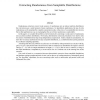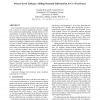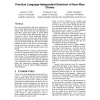49 search results - page 7 / 10 » Extractor codes |
139
click to vote
FOCS
2000
IEEE
15 years 6 months ago
2000
IEEE
Randomness extractors convert weak sources of randomness into an almost uniform distribution; the conversion uses a small amount of pure randomness. In algorithmic applications, t...
127
Voted
ICSM
2006
IEEE
15 years 8 months ago
2006
IEEE
Facts extracted from source code have been used to support a variety of software engineering activities, ranging from architectural understanding, through detection of design patt...
100
click to vote
ICIP
2010
IEEE
15 years 3 days ago
2010
IEEE
In this paper, we develop an adjustable Fuzzy Extractor using the Physical Unclonable Functions (PUF) obtained by a common laser engraving method to sign physical objects. In part...
143
Voted
CASCON
2004
15 years 3 months ago
2004
Previous research shows that most software systems contain significant amounts of duplicated, or cloned, code. Some clones are exact duplicates of each other, while others differ ...
135
Voted
STOC
2005
ACM
16 years 2 months ago
2005
ACM
This paper explores what kinds of information two parties must communicate in order to correct errors which occur in a shared secret string W. Any bits they communicate must leak ...



